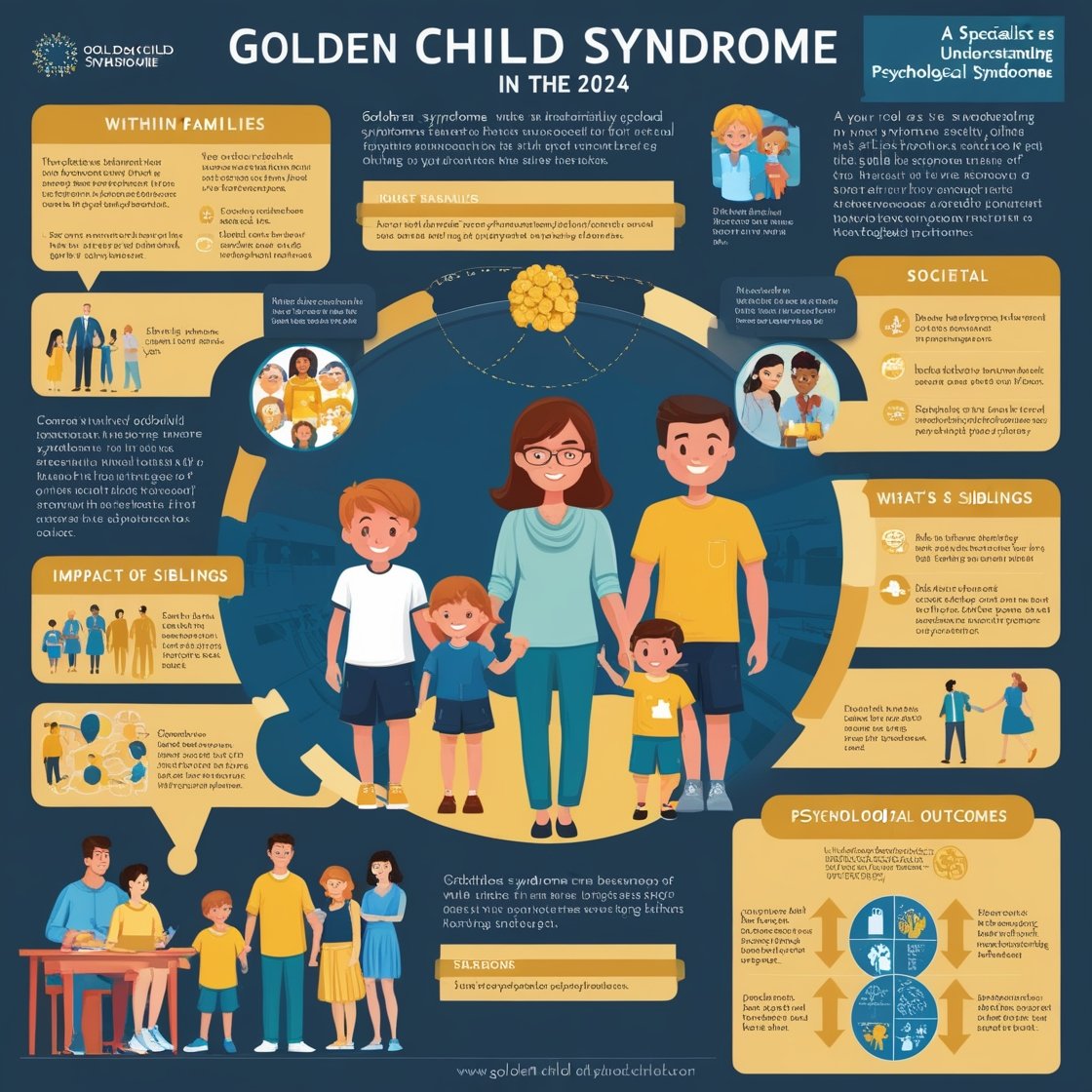Golden Child Syndrome is a psychological phenomenon often overlooked in discussions about family dynamics. It refers to the practice of parents favoring one child over others, bestowing upon them excessive praise, attention, and privileges. This favoritism can have profound effects not only on the “golden child” but also on their siblings, the family as a whole, and the child’s long-term development. As we delve deeper into this syndrome, it becomes evident that the ramifications extend beyond childhood, influencing the adult life and relationships of the golden child. In this article, we will explore what Golden Child Syndrome entails, its causes, and its long-lasting impacts.
What is Golden Child Syndrome?
Golden Child Syndrome is characterized by a child being singled out as the “ideal” or “perfect” child in a family. This child is often seen as the epitome of what the parents value most—whether it be intelligence, beauty, obedience, or some other trait. The golden child is often showered with unwarranted praise, attention, and privileges that are not equally given to their siblings.

The Origins of Golden Child Syndrome
The roots of Golden Child Syndrome often stem from the parents’ unmet needs or unresolved issues. A parent may see their child as an extension of themselves, seeking to fulfill their own ambitions or relive their own successes and failures through the child. For instance, a parent who once had aspirations of becoming a professional athlete may push their golden child toward athletic success, heaping praise and resources upon them while neglecting the needs or desires of their other children.
Psychological Impact on the Golden Child
The golden child may initially enjoy the constant approval and attention. However, this dynamic can create a burden of expectations that can lead to anxiety, perfectionism, and low self-esteem. As they grow older, the golden child may struggle with an identity crisis, feeling pressure to maintain the idealized image imposed upon them. This pressure can result in difficulties in forming authentic relationships and a fear of failure, as the golden child is conditioned to equate their self-worth with their achievements.

Impact on Siblings
The siblings of the golden child are often the silent victims of this dynamic. They may experience feelings of neglect, resentment, and inadequacy as they are overshadowed by the favored sibling. These feelings can manifest in various ways, including rebellious behavior, withdrawal, or a relentless pursuit of their parents’ approval. The constant comparison to the golden child can leave siblings struggling with low self-esteem and identity issues well into adulthood.
Family Dynamics and Long-Term Consequences
Golden Child Syndrome can create a toxic family dynamic where the golden child is pitted against their siblings, fostering an environment of competition and resentment. Over time, this dynamic can fracture sibling relationships and cause lasting emotional scars. The golden child may grow up to be an adult who is overly dependent on external validation, while the overlooked siblings may harbor deep-seated resentment and a lack of trust in others.
Breaking the Cycle of Golden Child Syndrome
To break the cycle of Golden Child Syndrome, it is crucial for parents to become aware of their behaviors and the potential harm they may be causing. Parents should strive to recognize and appreciate the unique qualities of each of their children, rather than elevating one child above the others. Therapy and counseling can also play a significant role in addressing the underlying issues that contribute to this dynamic, helping both parents and children heal from the effects of Golden Child Syndrome.
What Kind of Parents Usually Grow a Golden Child
Parents who usually raise a golden child often share certain traits and behaviors, influenced by their own psychological needs, unresolved issues, or life experiences. Here are some common characteristics of these parents:
1. Narcissistic Tendencies
Parents with narcissistic tendencies may see their child as an extension of themselves. They project their own desires, aspirations, and unfulfilled dreams onto the child, expecting them to achieve what they could not. The golden child becomes a tool for the parent’s self-validation, receiving excessive praise and attention as long as they meet these expectations.
2. High Achievers with Unrealized Ambitions
Parents who were once high achievers or who had unrealized ambitions might push their child to excel in areas where they feel they fell short. They may focus on the child’s accomplishments to the exclusion of other aspects of their personality or needs, valuing the child more for their success than for who they are as an individual.
3. Insecure or Emotionally Unfulfilled
Some parents who are insecure or emotionally unfulfilled may create a golden child to fulfill their emotional needs. By elevating one child above the others, they seek to gain a sense of importance, love, or validation that they lack in other areas of their life. This child becomes the source of their emotional support and self-worth.
4. Perfectionistic Parents
Parents with perfectionistic tendencies may set extremely high standards for their children, and when one child meets these standards, they are elevated to the status of the golden child. These parents often equate love and approval with achievement, leading to a dynamic where the golden child feels immense pressure to continually excel.
5. Parents with Unresolved Trauma
Parents who have unresolved trauma or difficult past experiences may unconsciously create a golden child as a way to cope. They might overcompensate by pouring all their hopes, dreams, and affections into one child, while neglecting the emotional needs of their other children.
6. Competitive or Status-Conscious
Parents who are highly competitive or concerned with social status may create a golden child as a way to showcase their family’s success. They may push the child to excel in academics, sports, or other areas that they believe will bring prestige to the family, often ignoring the child’s true interests or well-being.
7. Parents Who Play Favorites
Some parents naturally gravitate toward favoritism, often without fully realizing the impact it has on their children. This favoritism can be based on any number of factors, such as the child’s resemblance to one parent, shared interests, or the child’s alignment with the parent’s values. This favoritism leads to the emergence of a golden child, who is singled out for special treatment.
Golden Child Syndrome Test
A Golden Child Syndrome Test can help identify whether a person has been affected by Golden Child Syndrome. This test is designed to prompt reflection on personal experiences and family dynamics. While it’s not a diagnostic tool, it can provide insights into whether someone might have been placed in the role of a golden child in their family.

Golden Child Syndrome Test:
1. Was one of your parents particularly focused on your achievements?
- A) Yes, they always emphasized my success.
- B) Sometimes, but not overly so.
- C) No, they treated all of us the same.
2. Did you often feel like you were the “favorite” child?
- A) Yes, I was often singled out for praise.
- B) Occasionally, but it wasn’t a consistent thing.
- C) No, there was no noticeable favoritism.
3. Were you frequently compared to your siblings in a positive way?
- A) Yes, I was often held up as an example.
- B) Sometimes, but not regularly.
- C) No, comparisons weren’t common.
4. Did you feel a lot of pressure to meet your parents’ expectations?
- A) Yes, I felt like I couldn’t afford to fail.
- B) Occasionally, but not all the time.
- C) No, my parents didn’t place that kind of pressure on me.
5. Were your accomplishments celebrated more than those of your siblings?
- A) Yes, my successes were always highlighted.
- B) Sometimes, but my siblings were recognized too.
- C) No, everyone’s achievements were valued equally.
6. Did you often receive more privileges or attention than your siblings?
- A) Yes, I often got special treatment.
- B) Sometimes, but not always.
- C) No, everything was pretty even.
7. Did your siblings ever express resentment towards you for being favored?
- A) Yes, they often seemed upset or distant.
- B) Occasionally, but we got along most of the time.
- C) No, we didn’t have issues like that.
8. Do you find yourself struggling with perfectionism or fear of failure?
- A) Yes, I constantly feel like I need to prove myself.
- B) Sometimes, but it’s not overwhelming.
- C) No, I’m generally comfortable with my abilities.
9. As an adult, do you feel dependent on external validation for self-worth?
- A) Yes, I often seek approval from others.
- B) Sometimes, but I can also validate myself.
- C) No, I’m confident in who I am without needing approval.
10. Do you feel like your sense of self is tied to your achievements?
- A) Yes, I often define myself by what I’ve accomplished.
- B) Sometimes, but I also value other aspects of myself.
- C) No, I don’t measure my worth by my achievements alone.
Interpreting Your Results:
- Mostly A’s: It’s likely that you experienced Golden Child Syndrome. Your upbringing may have involved significant favoritism, leading to a strong focus on achievement and external validation. You might benefit from exploring these dynamics further, perhaps with the help of a therapist.
- Mostly B’s: You may have had some experiences related to Golden Child Syndrome, but they weren’t pervasive. It’s possible that you felt some pressure to excel, but it didn’t dominate your sense of self or family dynamics.
- Mostly C’s: You likely did not experience Golden Child Syndrome. Your family environment may have been more balanced, with less focus on one child being the “golden” one.
Conclusion:
This test can help bring awareness to the effects of being treated as a golden child. If you suspect that Golden Child Syndrome has impacted your life, it may be helpful to seek professional guidance to address any lasting effects.
Trauma Related to Development
Trauma, particularly in childhood, can significantly impact a person’s development. The effects can be far-reaching, affecting physical, emotional, cognitive, and social growth.
Impact on Development
- Physical Development: Trauma can lead to chronic health issues, sleep disturbances, and delayed physical growth.
- Emotional Development: Difficulty regulating emotions, forming attachments, and experiencing trust issues are common.
- Cognitive Development: Trauma can impact learning, memory, and attention, leading to difficulties in school.
- Social Development: Challenges in building relationships, communication, and cooperation can arise.











